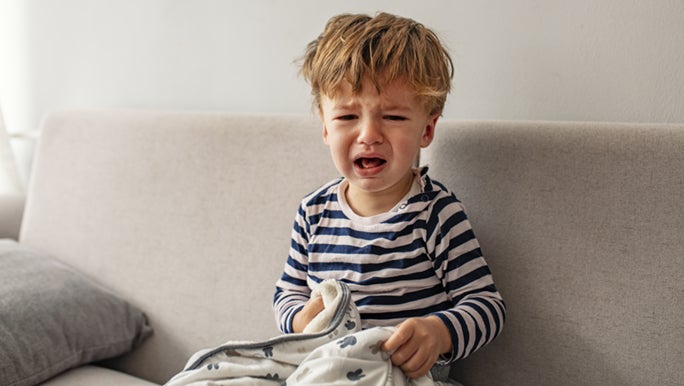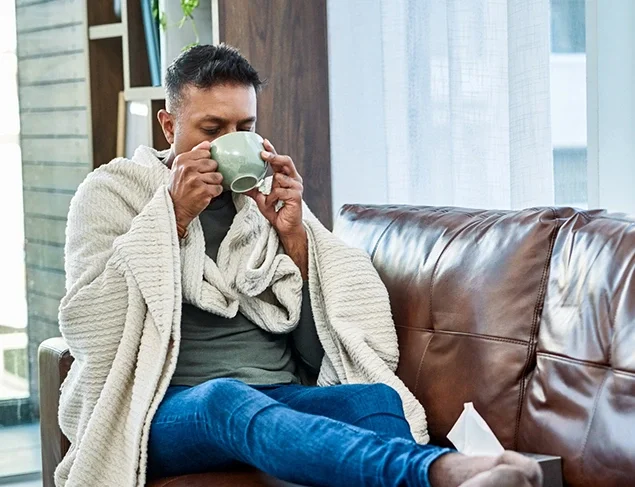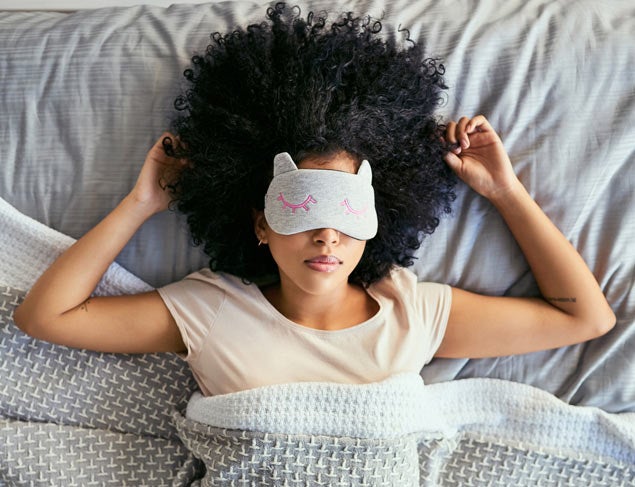“Oh no, not again. Please tell me: why do I keep getting sick?! I can’t handle another cold. Going to work sick was never mentioned in ‘How to Win Friends and Influence People’.
And I’ll have to restart the couch-to-5k training program from scratch…”
If any of that sounds familiar to you, it could be that your immune system is struggling.
We asked Dr Jill Gamberg, GP, to explain why you and your family may be frequently getting sick. Dr Jill also advised what you can do to help make your immune system stronger.
Reasons why you might have a weak immune system
Dr Jill says there are several lifestyle and physical factors that can lower your immune system function.
You’re not getting enough quality sleep
Sleep is so important for immune system health. “If we don’t get enough of it or it is low quality sleep, our immune systems go down, and we're more likely to get sick,” says Dr Jill.
Your food choices could be healthier
If you're prone to frequent infections and cold symptoms like a sore throat, it could be a sign that your immune health is less than optimal. A healthy diet that follows the approach to “eat the rainbow of colours” is a good practice, and includes lots of fruits, vegetables and whole grains.
immune health
immune health

Can you exercise with a cold or flu?
Being prepared to keep yourself well and understand when it’s okay to return to the sporting field, the running track or the gym may help you stay on track after an illness.
Your stress levels have been through the roof
“If we have really high levels of stress, we're much more likely to not be able to fight off an illness. If you are a bit run down, that’s when you get sick,” says Dr Jill.
You might need to be more active
Research suggests that moderate physical activity can stimulate your immune system. Dr Jill notes that, “You should aim for 150 minutes of moderate-intensity physical activity per week, broken up into manageable chunks to fit into your lifestyle. Even better if you can exercise outside to get a bit of vitamin D too.”
Other reasons why you might keep getting sick
Besides your immune system health, Dr Jill says that other factors might influence why you keep getting sick.

Dr Jill says it’s normal for kids to be sick more often than adults, the average preschooler having six or more colds a year.
You have a young child
“As a GP, I constantly have parents coming to the clinic asking why they keep getting sick. My answer? Kids,” Dr Jill says, “Especially little kids. They go to daycare, pick up a cold and then share it with their family.”
Dr Jill says it’s normal for kids to be sick more often than adults. With the average preschooler having six or more colds a year, it’s no wonder that many parents feel like they’re always sick with a cold.
“Sadly, you can literally get a new virus every couple of weeks. Don’t be fooled by thinking that if you’ve had a cold, then you can’t catch another cold, or a flu or a different virus altogether. ”
You have allergies
Dr Jill says that allergies can often be mistaken for colds. “I think sometimes people have chronic hay fever, and they can't tell the difference between a cold and a hay fever.” Speak to your doctor if your symptoms are ongoing or not improving though.
You touch your face too much
Dr Jill says that many people touch their face hundreds of times per day without thinking about it. “If people didn’t touch their faces, they wouldn’t get sick as often.”
It’s also important to think about others so you don’t spread your germs - wash your hands frequently, cough/sneeze into your elbow, stay home if you’re sick and wear a mask if you must leave the house.

Dr Jill says there are several lifestyle and physical factors that can lower your immune system function.
How to have a more healthy immune system
Dr Jill says that there is no magic pill to help a weak immune system. Instead, she recommends:
- getting better quality sleep more consistently
- learning and applying stress reduction techniques
- doing more regular physical activity
- improving your diet. Speak to a qualified dietitian to get nutritional advice specific to your needs.
- try to touch your face less during the day
- practice good cough/sneeze etiquette
- stay at home if you are sick
Ways to better immune health program
Understand more about immune health and things you can do to support yourself, this winter and beyond! Sign up for our FREE 5-day program and get your guide to a healthier immune system.
Help is available when you’re sick of being sick
There are many reasons why you keep getting sick. Your immune system health can be impacted by several things, from not getting enough sleep to what you’re eating. That’s why it’s important to see your GP when you are sick of being sick.
Even mild cold and flu symptoms can be a sign of something more serious in our current climate. So if you start feeling a sniffle, or a tickle in the back of your throat, don’t wait for your annual health check-up. Book an appointment sooner rather than later so that your GP can rule out any concerns.
related reads
7 sleep aids for a restful night's sleep
Discover our pick of sleep aids to help support better sleep.
immune health
immune health

10 interesting facts about the immune system
Fun fact: Did you know that a healthy immune system may help you get a better night’s sleep?
immune health
immune health

5 immune supporting habits to help you bounce back
Our top 5 expert-back tips to support your body when illness strikes and help you recover.
5-minute self-care activities for days when you just can’t even
Self-care doesn’t need to involve a grand plan to visit a health retreat. Even five minutes may make a difference.
Dr Jill Gamberg is a General Practitioner and one of the first Australian Lifestyle Medicine Physicians whose goal is to help prevent disease and maintain wellness with evidence-based practice, and to passionately improve health literacy.
Reviewed by the healthylife Advisory Board May 2022








